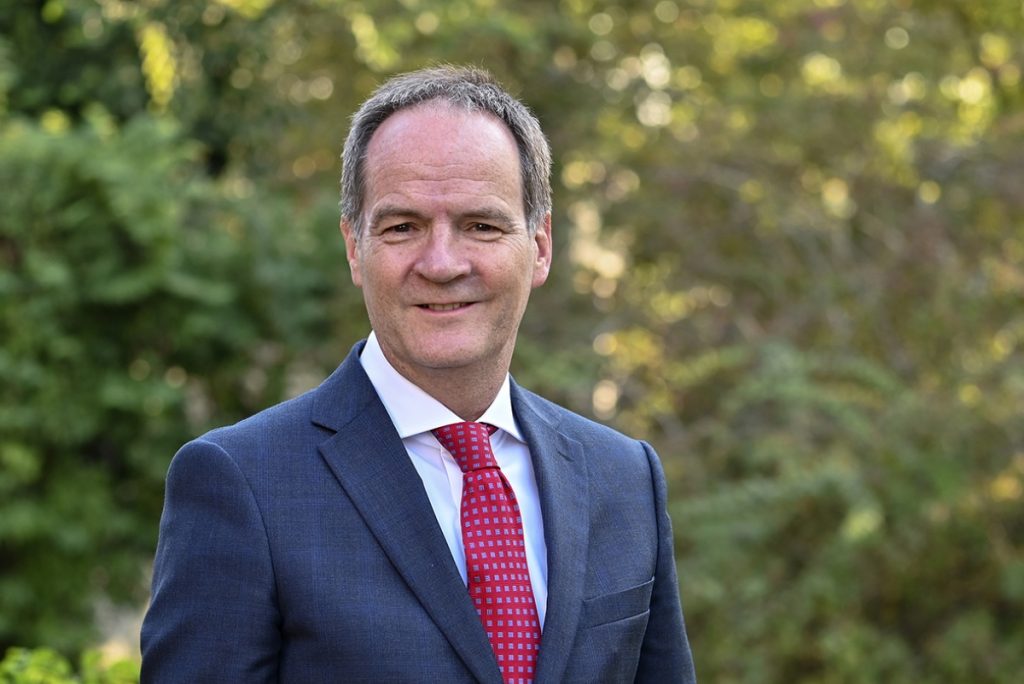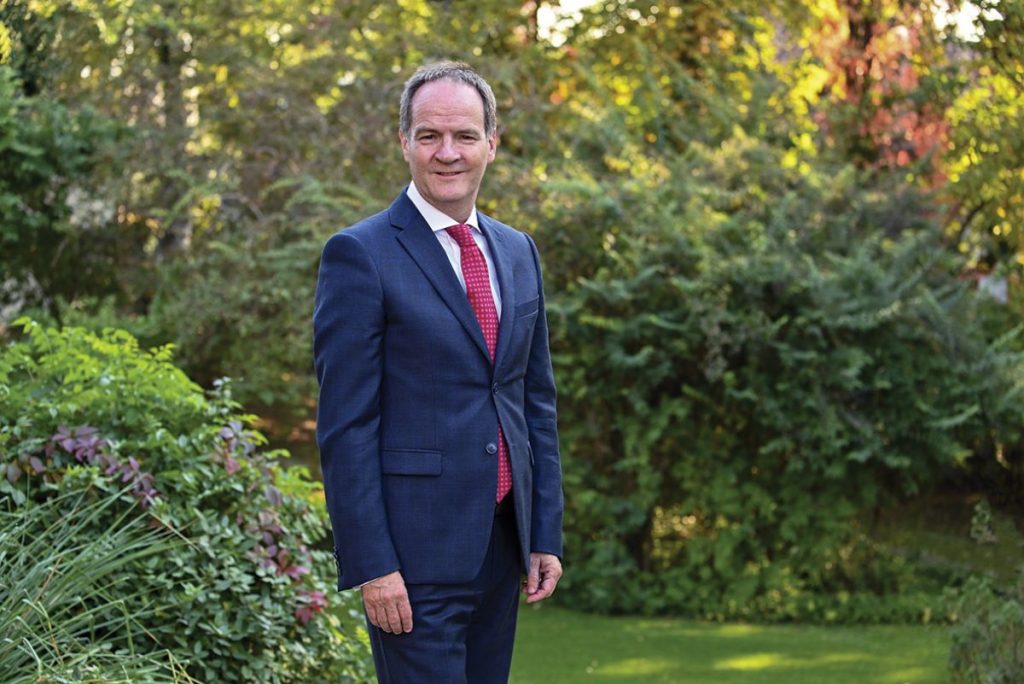Our relations are resting upon very dynamic exchanges between the people from our respective countries, from an economic to social and cultural perspectives
We spoke with Swiss Ambassador to Serbia H.E. Philippe Guex, about bilateral and economic cooperation, which are excellent and dynamic. In his interview, Ambassador pointed out that Switzerland provides support to the civil society, central and local governments, the Parliament and local assemblies to promote the citizens’ participation and political inclusion in Serbia.
“In Switzerland, we tend to be modest and not to give lessons. In other words, yes, Serbia can learn from Switzerland but Switzerland can also learn from Serbia” concluded Mr. Guex.

Switzerland and Serbia have remarkable bilateral relations. What is it that you are especially proud of that happened during your term, and what would you point out?
You are fully right in assessing the quality of the bilateral relations between Serbia and Switzerland. Our bilateral relations are indeed excellent. They are also very diverse. Most importantly, our relations are resting upon very dynamic exchanges between the people from our respective countries, from an economic to social and cultural perspectives. At the time of crisis, solidarity between countries and people is essential. I am particularly proud of the fact that Switzerland has stayed a very important donor country in Serbia during my term, contributing for over 2o millions euros per year, including during the Covid-19 pandemic.
Economic relations are also excellent, Swiss companies employ over 10,000 workers. To what extent has the pandemic slowed down Switzerland’s economy, and will this affect the investments in Serbia?
The resilience of the economy is being tested in Switzerland during the pandemic as it the case in each country. Since our economy rests on solid foundations and that unemployment is very low in Switzerland, we have the capacity to mitigate the crisis and to support sectors that are particularly hit by the slowdown of the global economy. Nevertheless, our national economy is of course interdependent with other countries’ economies, particularly those belonging to the European Union, our main economic partner. Concerning our economic relations with Serbia, we are assessing the impact of the pandemic; however, the Swiss companies in Serbia are doing everything in their power to keep their employees at their jobs and to continue to invest.
The coronavirus pandemic struck the entire world. What was the hardest thing during the state of emergency, and how did you communicate with the community in Serbia? Were there any special requests from Swiss citizens and companies?
The Swiss Embassy, in particular our consular section, is doing everything it can to assist Swiss citizens in these challenging times. We have been in constant contact with our Swiss community and tried to respond to each request. Thanks to our good contacts with the Serbian authorities and in particular with the Serbian Ministry of Foreign Affairs, we have been able to assist our citizens, inter alia by organizing repatriation flights from Belgrade to Zurich back in April and May.
“We strongly support Serbia and other Western Balkans countries’ integration into the European Union”
There has been a lot of talk about regionalization in the Western Balkans, Mini- Schengen, WB integration into the EU. Will Switzerland, as a NON-EU country, continue to support Serbia on its path to the EU, and what does that mean for the Swiss investors?
We strongly support Serbia and other Western Balkans countries’ integration into the European Union. Switzerland’s position has always been that not only EU membership would be positive for the countries in the region, but also that the reforms in order to achieve that goal are important for improving the lives of the people living in the Western Balkans. Other processes, such as the so-called “Mini-Schengen” initiative, are positive as long as they are inclusive and result oriented, in a sense that these processes facilitate the regional integration and do not exclude any country in the region.

Switzerland is one of the four biggest bilateral donors in Serbia when it comes to reforms, SME development and public administration strengthening. Do you think that something will change when it comes to the dialogue between the public and the civil sector in Serbia, which is estimated to be at a very low level?
Dialogue is possible if there is a genuine willingness of all sides to engage in it in the mutual interests of the country and its citizens. Switzerland has a long tradition of societal dialogue inbuilt in the legislation and political culture of consensus. In Serbia, we provide our support to the civil society, central and local governments, the Parliament and local assemblies to promote the citizens’ participation and political inclusion. Guided with the principle “Leave No One Behind”, we think that each individual should participate in political and economic life. Moreover, we strongly support and promote a society-wide dialogue between the state, civil society and the business sector on the development priorities of the country and society.
“We are going to launch an important initiative in that sense in the near future, strengthening cultural development throughout Serbia from a governance perspective”
Our two countries have also been cooperating a great deal regarding the introduction of a dual education system in Serbia. How do you rate Serbia’s progress on this matter?
Cooperation on the dual education reform is excellent between our two countries, also being aware that it is about system building, that is a long-term process. Switzerland supports the reform process with legal advice, the exchange of best practices in monitoring the system and by pointing out specific challenges and sharing possible solutions. Findings and conclusions of our Swiss experts are shared with the Serbian partners in the Ministry of Education. Therefore, we look forward to continue the exchange and to further contribute to the positive developments in this sector with more quality results yet to come.
An exhibition of young artists, finalists of the “Private Value” Competition, was recently held at your residence. How important is that cooperation in the field of culture and art, and which project would you especially single out?
Promoting young Serbian artists has been an important aspect of our cultural exchanges in recent years. The project that you are mentioning, “private value”, showed, for the third consecutive year, to which extent the young Serbian artists are not only talented but also are conveying important messages and reflections in times of crisis. More generally, we are supporting cultural initiatives not only in Belgrade but also beyond, working together with municipalities. We are going to launch an important initiative in that sense in the near future, strengthening cultural development throughout Serbia from a governance perspective.
Is there room for further improvement of our overall relations and what can we learn from Switzerland?
In Switzerland, we tend to be modest and not to give lessons. In other words, yes, Serbia can learn from Switzerland but Switzerland can also learn from Serbia. That is I suppose what we mean by diplomacy, a constant exchange between countries in many areas with the aim of mutual learning and enriching our experiences.
Welcoming People
What do you like the most in Belgrade, and is there anything in particular that you would like to point out when it comes to Serbia?
Serbia is a country that has (and everybody who has come here will tell you) wonderful and very welcoming people. Belgrade, in particular, is a very dynamic capital, full of life and developing itself every day in an impressive way. The artistic and cultural scene is very rich, the gastronomy is excellent and like Switzerland, despite the fact we are landlocked countries, our landscapes are beautiful!